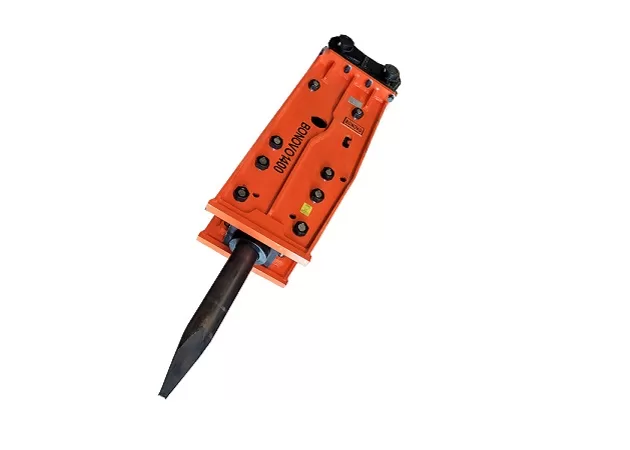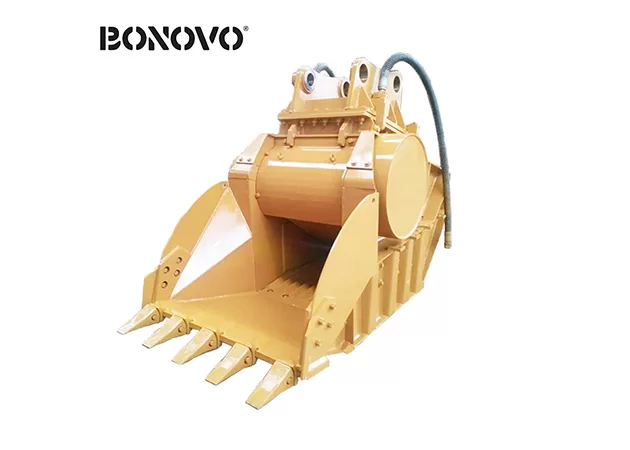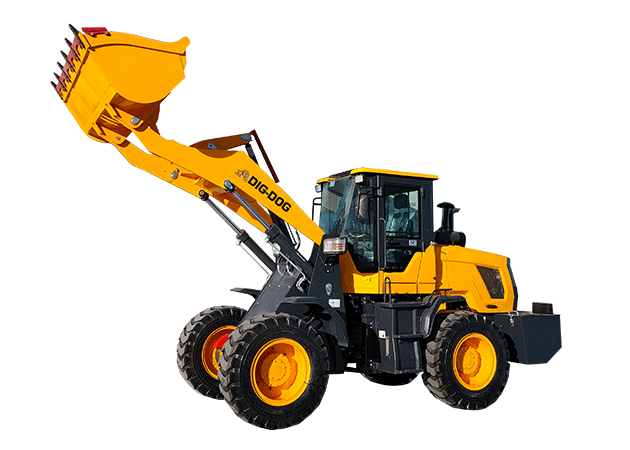Excavator Lifespan: How Long Can You Expect Your Heavy Machinery to Last - Bonovo
Excavator Lifespan: How Long Can You Expect Your Heavy Machinery to Last?
Have you ever wondered how long your trusty excavator will keep digging, lifting, and powering through tough jobs? Understanding the lifespan of construction equipment is crucial for budgeting, planning projects, and maximizing your investment. This article dives deep into the factors influencing how long your heavy machinery will last, focusing on excavators, wheel loaders, and backhoe loaders. We'll explore typical lifespans, how to extend the life of your equipment, and what you can do to ensure you get the most out of every piece of equipment in your fleet. Whether you're a seasoned contractor or new to the construction world, this guide will help you better understand typical equipment lifetime and value most in your equipment.
1. What is the Average Lifespan of Construction Equipment?
When we talk about the lifespan of construction equipment, it's not just about years on the calendar. It's about how many hours a machine can reliably operate before major overhauls or retiring equipment become necessary. The average lifespan varies from machine to machine, but generally, you can expect heavy equipment to provide many years of service with proper maintenance. Thinking about the life of heavy machinery is like thinking about the life of a piece of equipment – each type has its own typical duration.
Construction equipment is built to be tough, but wear and tear is inevitable, especially in challenging conditions. Factors like the type of work, operator skill, and regular maintenance all play a significant role in determining how long a machine will last as long. While there's no magic number, understanding typical lifespans helps you plan for replacements, budget for repair costs, and make informed decisions about selling the equipment or investing in new equipment.
2. How Long Does an Excavator Typically Last? What is the Average Excavator Lifespan?
If you’re wondering how long your excavator will last, you're asking a great question! An excavator is a workhorse on any construction site, and its life expectancy is a key consideration. Generally, a well-maintained excavator can have an average lifespan of around 7 to 10 years, or approximately 7,000 to 10,000 hours of operation. However, with excellent care and regular maintenance, some excavators can even exceed this, reaching 15 years or more. This means the average excavator lifespan is about 10 years.
It's important to remember that this is just an average lifespan. The actual life span of your excavator can be significantly shorter or longer lifespan depending on several factors we'll discuss later. Think of it this way: an excavator operates in demanding environments, and how you treat it directly influence how long it will serve you. Just like a car, an excavator that's driven hard and neglected will have a shorter usable life than one that's carefully operated and meticulously maintained. So, to extend the life of your excavator, proactive care is essential.

Maximize your excavator's lifespan with proper attachments and maintenance.
3. What Factors Influence How Long an Excavator Will Last?
Several key factors determine how long an excavator will typically last. Understanding these factors is crucial for maximizing the life of your equipment.
- Operating Conditions: Excavators working in harsh environments with heavy or abrasive materials will experience more wear and tear, potentially shortening their lifespan. Think about the difference between digging in soft soil versus hard rock – the latter puts significantly more stress on the machine.
- Maintenance Schedule: Regular maintenance is paramount. Machines that receive consistent servicing, including regular inspections, lubrication, and timely repair of minor issues, are likely to last longer. Neglecting maintenance is a surefire way to reduce the usable life of your excavator.
- Operator Skill: A skilled operator who understands acceleration control and clutch modulation and avoids unnecessary stress on the machine can significantly extend the life. Aggressive operation and misuse can lead to premature component failure and a shorter life span.
- Quality of Components: The initial quality of the excavator itself matters. Machines built with high-quality materials and robust construction are generally more durable and have a longer lifespan as well. Investing in reputable brands known for quality can pay off in the long run.
- Storage: Even when not in use, how you store your excavator matters. Storing a machine indoors or under cover can protect it from the elements, reducing corrosion and extending the life of this machine. Leaving a machine outdoors during periods of inactivity exposes it to rust and degradation, which can shorten its equipment’s lifespan.

Different attachments affect excavator workload and lifespan.
4. Excavator Bucket Wear and Tear: How Does It Affect Lifespan?
The bucket is the primary work tool of an excavator, and its condition directly impacts the machine's efficiency and lifespan. Buckets for wear and scalloping are constantly subjected to abrasion, impact, and stress. Over time, this leads to wear and tear, which, if not addressed, can affect the life of a piece of equipment.
- Reduced Efficiency: Worn buckets are less efficient at digging and loading. Rounded cutting edges and damaged teeth reduce penetration and capacity, slowing down work and increasing fuel consumption.
- Increased Stress on Machine: Trying to work with a damaged bucket puts extra strain on the excavator's hydraulic system and engine. This added stress can accelerate wear on other components and shorten the overall life span.
- Potential for Breakdowns: Neglecting bucket maintenance can lead to cracks and structural failures. A broken bucket can cause significant downtime and costly repair.
Keeping a bucket in good condition is crucial. Regular inspections should include checking buckets for wear on cutting edges, teeth, and the main body. Promptly replacing worn teeth, repairing cracks, and reinforcing wear areas can significantly extend the life of your bucket and, consequently, the excavator. Consider investing in high-quality excavator buckets from reputable manufacturers like BONOVO to ensure durability and longevity. Explore our range of durable Excavator Buckets designed for demanding applications.
5. How Does Regular Maintenance Impact Excavator Life Expectancy?
Regular maintenance is the single most important factor in maximizing excavator life expectancy. Think of it as preventative medicine for your machine. Just like a car needs oil changes and tune-ups, an excavator needs consistent care to perform reliably and last longer.
- Reduces Wear and Tear: Proper maintenance includes lubrication of moving parts, timely replacement of filters and fluids, and adjustment of components. This reduces friction and stress, minimizing wear and tear and preventing premature failure.
- Prevents Major Repairs: Regular inspections can catch minor issues before they escalate into major problems. For example, detecting a small hydraulic leak early can prevent a catastrophic pump failure later. Timely repair of small issues saves money and downtime in the long run.
- Maintains Performance: A well-maintained excavator operates at peak efficiency. Clean filters, properly adjusted systems, and sharp bucket teeth ensure optimal performance, reducing fuel consumption and increasing productivity.
- Extends Component Life: Regular maintenance directly impacts the components will last. For example, proper brake maintenance extends the lifespan of brakes, and regular engine servicing ensures a longer engine and transmission life.
A comprehensive maintenance schedule should include daily checks by the operator, periodic servicing by qualified technicians, and adherence to the manufacturer's recommendations. Investing in regular maintenance is not an expense; it's an investment in the longevity and reliability of your valuable machinery.
6. What is the Average Lifespan of a Wheel Loader?
Similar to excavators, wheel loaders are essential pieces of equipment on many job sites. Wondering how long your wheel loader will last? The average lifespan of a wheel loader is also around 7 to 10 years, or roughly 7,000 to 10,000 hours of operation. Just like with excavators, this can vary based on usage and maintenance. If you want to know long your wheel loader can go, proper care is key to making a wheel loader last.
Wheel loaders are often used for loading and moving materials, and their buckets endure significant stress. Factors like the type of material handled, terrain, and operator habits all influence their life span. Regular maintenance, including engine and transmission servicing, hydraulic system checks, and brake inspections, is crucial for maximizing the usable life of a wheel loader. With diligent care, a wheel loader can provide reliable service for many years, offering a similar average lifespan to excavators. Explore our range of robust Wheel Loader Buckets to optimize your machine's performance and lifespan.

Wheel loaders, like excavators, benefit significantly from regular maintenance.
7. Backhoe Loader Lifespan: Are They as Durable as Excavators?
Backhoe loaders are versatile machines, combining the functions of a wheel loader and an excavator. But are they as durable? Backhoe loader lifespan is generally comparable to excavators and wheel loaders, with an average lifespan of around 6 to 8 years, or 6,000 to 8,000 hours. While some might think backhoe loaders don’t last as long as dedicated excavators in extremely heavy-duty applications, they are still incredibly versatile and last for a substantial period with good maintenance.
The components in a backhoe loader, including the engine, transmission, hydraulic system, and buckets, are designed for demanding work. However, because they perform multiple tasks, they can experience varied types of stress. Regular maintenance is especially important for backhoe loaders to ensure all systems are functioning optimally. Checking the brake system, hydraulic lines, and engine regularly will help you get the most out of your backhoe loader. When backhoe loader have reached their usable life, it's often due to accumulated wear across multiple components rather than a single catastrophic failure. Consider quality attachments like our Backhoe mechanical thumb to enhance versatility and protect your machine.
8. Can Proper Operator Habits Lengthen the Life of Heavy Equipment?
Absolutely! The operator plays a vital role in determining the life span of heavy equipment. Good operator habits can significantly lengthen the life of your machinery, while poor habits can drastically shorten it. A skilled operator is one of the best investments you can make to protect your equipment.
- Smooth Operation: Operators who use smooth, controlled movements, avoid sudden stops and starts, and practice acceleration control and clutch modulation reduce stress on the machine's hydraulic system, engine, and transmission.
- Proper Warm-up and Cool-down: Allowing the engine to warm up properly before starting heavy work and letting it cool down before shut-off are crucial for engine longevity. This prevents thermal shock and reduces wear and tear.
- Avoiding Overloading: Operating within the machine's rated capacity is essential. Overloading puts excessive stress on all components and accelerates wear.
- Regular Inspections and Reporting: A good operator performs daily walk-around inspections, checking fluid levels, tire pressure, and looking for any signs of damage or leaks. They also promptly report any issues, allowing for timely repair before they escalate.
- Correct Attachment Use: Using the right attachment for the job and operating it correctly prevents unnecessary stress on the machine. For example, using a rock bucket for digging in rock and a general-purpose bucket for softer materials.
Investing in operator training and promoting good operating practices are key to maximizing the life of heavy equipment and reducing repair costs.
9. What are Key Maintenance Tips to Extend the Life of Your Machinery?
To truly extend the life of your machinery, a proactive and consistent maintenance approach is essential. Here are key maintenance tips to help your excavator, wheel loader, and backhoe loader last longer:
- Follow the Maintenance Schedule: Adhere to the manufacturer's recommended maintenance schedule. This includes regular oil changes, filter replacements, lubrication, and inspections.
- Daily Inspections: Encourage operators to perform daily pre-start inspections. Check fluid levels (engine oil, hydraulic fluid, coolant), inspect hoses and belts for leaks or damage, and examine buckets and attachments for wear.
- Regular Lubrication: Proper lubrication is critical to reduce friction and wear on moving parts. Grease all lubrication points regularly, following the manufacturer's guidelines.
- Hydraulic System Care: Keep the hydraulic system clean and well-maintained. Check for leaks, replace filters regularly, and use the correct hydraulic fluid.
- Engine Maintenance: Regular engine servicing is vital. Change oil and filters as recommended, check coolant levels and condition, and inspect belts and hoses.
- Tire and Undercarriage Maintenance: For wheel loaders and backhoe loaders, maintain proper tire pressure and inspect for damage. For excavators and crawler loaders, regularly inspect the undercarriage for wear and damage to tracks, rollers, and sprockets.
- Battery Care: Keep battery terminals clean and check electrolyte levels (if applicable). For forklifts and electric machines, ensure batteries are properly charged and maintained, as batteries will only last a certain number of charge cycles.
- Prompt Repairs: Address any issues promptly. Don't delay repair of minor problems, as they can quickly become major, costly repairs.
- Cleanliness: Keep your machines clean. Regular washing removes dirt, debris, and corrosive materials, preventing rust and allowing for easier inspection.
- Proper Storage: When not in use, store your machinery in a sheltered location to protect it from the elements. Storing a machine indoors or under a cover significantly reduces wear from weather exposure.
By implementing these maintenance tips, you can significantly lengthen the life of your machinery, reduce downtime, and maximize your return on investment.
10. When is it Time to Repair or Replace Your Excavator or Wheel Loader?
Knowing when to repair versus replace your excavator or wheel loader is a critical decision. There's a point where the cost of the equipment to maintain outweighs the value most in your equipment. Here are some factors to consider when deciding between repair and replacement:
- Age and Hours: If your machine is approaching or has exceeded its average lifespan (e.g., 10 years or 10,000 hours for an excavator), it's more likely to require frequent and costly repairs. Machines on our list that are older may have reached their b50 component life or b80 component life, meaning major component failures are increasingly likely.
- Repair Costs: Compare the estimated repair costs to the machine's current market value. If repair costs are a significant percentage of the machine's value (e.g., 50% or more), replacement might be a more economical option.
- Downtime: Consider the downtime associated with repairs. Frequent breakdowns lead to project delays and lost productivity. New equipment, while a larger upfront investment, can offer greater reliability and less downtime.
- Performance and Efficiency: Older machines may suffer from decreased performance and fuel efficiency. New equipment often incorporates technological advancements that improve productivity and reduce operating costs.
- Safety: Older machines may have outdated safety features or experience safety-related issues due to wear. Replacing with new equipment can enhance safety on the job site.
- Resale Value: The machine’s remaining life and condition significantly impact its resale value. If you plan on selling the equipment eventually, investing in repairs to maintain its condition can be worthwhile. However, there's also a high rate of depreciation for older machinery, so replacement might be better for long-term financial planning.
- Availability of Parts: For very older machine models, sourcing spare parts can become difficult and expensive. This can lead to longer downtime and higher repair costs.
Ultimately, the decision to repair or replace should be based on a careful cost-benefit analysis, considering both the immediate repair expenses and the long-term operational costs and benefits of each option.
11. Investing in Quality Buckets and Attachments for Longer Lifespan.
Investing in high-quality buckets and attachments is not just about performance; it's also about longer lifespan for your entire piece of equipment. Durable attachments reduce stress on the machine and contribute to overall longevity.
- Reduced Wear on Machine: Well-designed, robust attachments minimize strain on the excavator or wheel loader. For example, a properly sized and reinforced bucket reduces stress on the hydraulic system and boom.
- Increased Efficiency: Efficient attachments improve productivity, reducing the amount of time the machine needs to operate for a given task. This, in turn, reduces overall operating hours and extends the life span.
- Fewer Breakdowns: Quality attachments are less likely to fail or break down, reducing downtime and repair costs. This reliability contributes to a longer usable life for the entire system.
- Better Performance in Challenging Conditions: Heavy-duty attachments, like rock buckets or hydraulic hammers, are designed to withstand challenging conditions without premature wear or damage. This ensures consistent performance and longer lifespan even in demanding applications.
BONOVO offers a wide range of high-quality attachments, including Excavator Attachments, Skid Steer Attachments, and Wheel Loader Attachments. Our attachments are built with durable materials and robust construction to maximize performance and extend the life of your valuable machinery. Choosing quality attachments is an investment in the longevity and efficiency of your entire equipment fleet.
Key Takeaways for Maximizing Construction Equipment Lifespan
- Average Lifespan: Excavators, wheel loaders, and backhoe loaders typically have an average lifespan of 7-10 years or 7,000-10,000 hours, but this can vary.
- Maintenance is Key: Regular maintenance is the most crucial factor in extend the life of your machinery. Follow schedules, inspect regularly, and address issues promptly.
- Operator Matters: Skilled operators who practice smooth operation and proper machine handling can significantly lengthen the life.
- Quality Attachments: Invest in high-quality buckets and attachments to reduce stress on your machines and improve efficiency.
- Repair vs. Replace: Consider age, repair costs, downtime, and performance when deciding whether to repair or replace equipment.
By understanding these factors and implementing proactive maintenance and operation strategies, you can significantly extend the life of your construction equipment and ensure you get the maximum return on your investment. Remember, taking care of your machines is taking care of your business!




